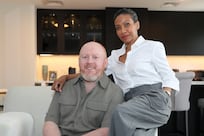News of the attacks on the New York Trade Center towers emerged shortly before the UAE newspapers hit deadline, so the Arabic press had to move fast.
Imad Makari, who was the head of the politics section at Al Ittihad newspaper, says when the news came out it was "complete chaos".
"I still remember the headline; we used the term 'kamikaze', which refers to the tactic the Japanese used in war when their pilots flew their planes into buildings to bomb them," Mr Makari recalls. "We called it a terrorist kamikaze attack."
He says when the New York attack first happened "some people thought 'Wow, this is happening to the US'".
"But then after a while the picture became more clear," he says. "There started to be a reaction and talk began about how they [the US] planned to invade Afghanistan and then Iraq - and that was before the US announced anything about attacking Afghanistan."
Regardless of the doubts and rumours that had been circulating post-September 11, the editors of Al Ittihad did not hesitate in calling it a terrorist attack.
"Because there were civilians killed, we did not think twice before describing it as a terrorist attack, even before the official UAE statement condemning the act was released," he explains.
"In the first few hours there was chaos, because half of the people did not believe what they were seeing. They thought 'is it possible this is a movie?'"
Khaled Abu Kryeim, who was the deputy editor of the Arab and International section at Al Bayan newspaper, says that "at first glance the news was very difficult".
He says there was confusion among the editors on how they should approach the news, especially since some websites and channels started to blame the Popular Front for the Liberation of Palestine (PFLP).
"How do we deal with an attack that could be related to a Palestinian group. The issue was under many discussions and we decided to deal with it in an objective way without any emotions," he says.
Then things started to become clear after Al Qaeda admitted to carrying out the attack.
"There were many issues to consider - and red lines."
They found themselves in a dilemma between opposing the attack and at the same time opposing the US's use of the attack to turn the world against Muslims by describing them as terrorists.
"We focused our attention on the effects of the events on Americans from Muslim and Arab origins. We used our correspondents in Washington and New York to follow the issue," says Mr Kryeim.
"We used this to help balance the picture and to make our point that we are against such actions but at the same time we oppose taking advantage of such events to attack Muslims."
Back then, he says, the Arabic media had not expected such an event. "It was a surprise for everyone. We tried to play it in a dynamic way as a daily newspaper.
"During the first few hours the identity of the attackers remained unknown. But at around 9pm we received the denial from the Palestinian side."
In general, the newspaper tried to focus on the humanitarian angle rather than the political aspect, he adds.
Lahib Rashid, who was a senior editor in Al Bayan's Wednesday supplement, says when the news came out at 5pm they had to stop the presses. "As a weekly supplement, everything was already sent for printing."
They had to change the cover page and two full pages inside.
"We were at work, and suddenly we heard someone yelling from the chief editor's office, that was where the TV was," Ms Rashid says.
They decided to do two analysis pieces on how a security gap occurred within the US and how America's formidable security system had been broken.
The second piece focused on the US's problematic foreign policy that had made it the target of such attacks.
"That was our initial reaction to the news, because in the early hours you cannot make a full decision," Ms Rashid says.
When the news first came out, she suspected it could be linked to American terrorist groups.
"I found studies on the internet that confirmed the existence of around 50 American terrorist group. They had militias and arms. They were not Muslim groups. Some were right-wing extremists," Ms Rashid adds.
From the American side, she says, they were ready to name a suspect and their first was Al Qaeda and Osama bin Laden.






